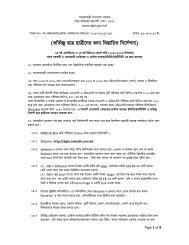Health Bulletin 2009
Health Bulletin 2009
Health Bulletin 2009
You also want an ePaper? Increase the reach of your titles
YUMPU automatically turns print PDFs into web optimized ePapers that Google loves.
Response to Super Cyclone SIDR<br />
Super Cyclone SIDR hit the country on 15 November 2007 which caused a massive damage to<br />
the health infrastructures mainly in 9 districts of southern Bangladesh along with other 21<br />
districts moderately and partially affected. Approximately 3500 lives were lost, 16 thousand<br />
people were injured and the safe drinking water sources and sanitary infrastructures were<br />
inundated by dirty water caused by dead animals, human bodies and other debris. The extent of<br />
casualty was quite minimum. The experts says its only because of better preparedness.<br />
In response to SIDR consequence, the Directorate General of <strong>Health</strong> Services of MoHFW took<br />
necessary steps to mitigate the adverse effects. Thus monitoring the health situation was in<br />
place as ongoing basis and 690 medical teams were worked in 9 severely Sidr affected districts<br />
<strong>Health</strong> cluster coordination meetings (MoHFW, health related NGOs, UN & donor agencies)<br />
were continued in Dhaka and 9 districts; Members of the Armed Forces with local administration<br />
worked round the clock for rescuing assets and distributing relief goods, rice, safe drinking<br />
water, Water Purification Tablet (WPT) in the affected areas; <strong>Health</strong> education Bureau, (DGHS)<br />
had continued to further strengthen health promotional activities to build awareness among the<br />
affected population with technical support from WHO; emergency life-saving drugs had been<br />
supplied by MoHFW, WHO and other stakeholders and regular dispatch of medical supply was<br />
continuing to replenish emergency buffer stock; vacant posts of professors, associate<br />
professors, assistant professors and senior consultants were filed up in the medical colleges of<br />
affected areas by MoHFW; situational health assessment was completed by Marlin on behalf of<br />
DGHS, IEDCR & WHO existing disease surveillance form were redesigned for better reporting.<br />
In response to Sidr, WHO also took necessary initiatives to avert the consequences of Sidr by<br />
deploying public heath specialists who were providing support for coordination among GOB, UN<br />
agencies, NGOs and other stake holders through district health cluster coordination meeting,<br />
initiating training on health education, capacity building for the health personnel and surveillance<br />
support.<br />
WHO also provided 4 water purifying plants and 3 water pumps that are installed in Morelgonj<br />
and Sharankhola upazilas of Bagerhat district, Pathorghata upazila in Barguna district and<br />
Mothbaria upazila in Pirozpur district to ensure safe drinking water in health facilities and for<br />
affected population and therefore, no disease outbreak occurred in the Sidr affected areas.<br />
43


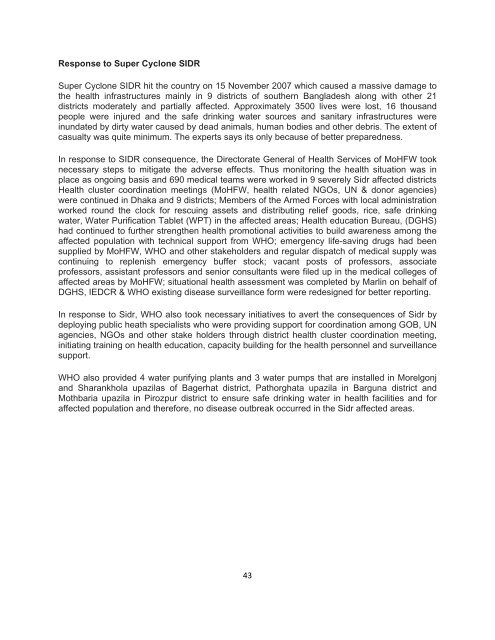
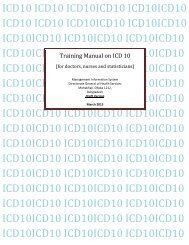
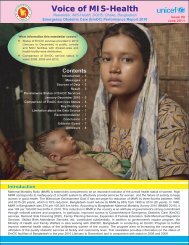

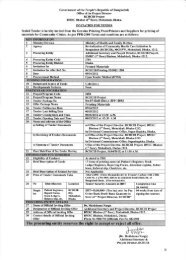

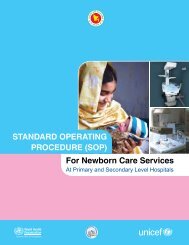
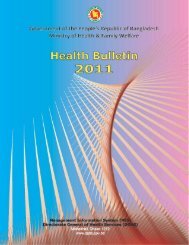
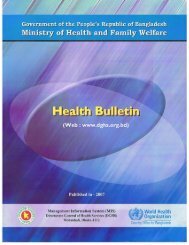
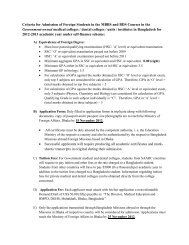
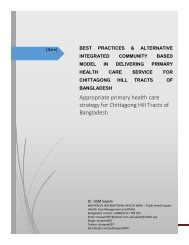
![Bangladesh Demographic and Health Survey 2007 [FR207]](https://img.yumpu.com/38440445/1/190x257/bangladesh-demographic-and-health-survey-2007-fr207.jpg?quality=85)
